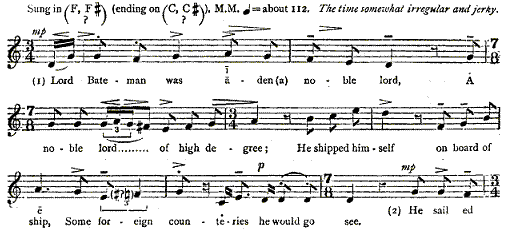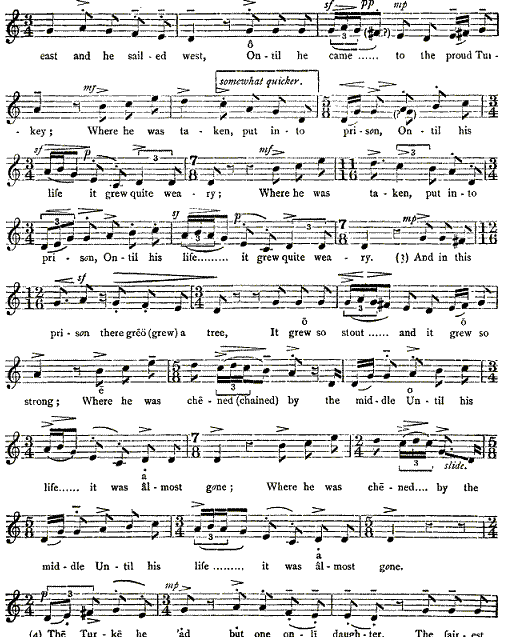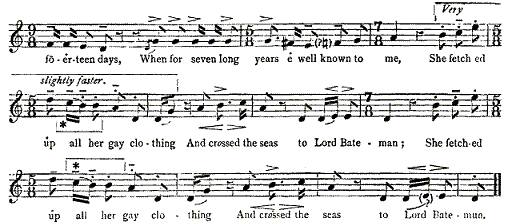Lord Bateman- Wray (Lincolnshire) 1904 Grainger B
[Songs Collected by Percy Grainger]
by Lucy E. Broadwood, Percy Grainger, Cecil J. Sharp, Ralph Vaughan Williams, FrankKidson, J. A. Fuller-Maitland, A. G. GilchristReviewed work(s):Source: Journal of the Folk-Song Society, Vol. 3, No. 12 (May, 1908), pp. 170-242
11.-LORD BATEMAN.
SECOND VERSION.
SUNG BY MR. GEORGE WRAY, OF BARTON-ON-HUMBER, LINCOLNSHIRE,
Phoniographed and noted by Percy Grainiger. AT BRIGG, LINCOLNSHIRE, AUG., 4TH, I904
Sung in (F, F (ending on (C, C M)). M.M. J-about I I2. The timing somewhat irregular and jerky.



(1) Lord Bate - man was a) no - ble lord,
A no - ble lord . of high de gree; He shipped him - self on board of
ship, Some for - eign coun te - ries he would go see.
(2)He sailed east and he sail - ed west,
On - til he came ...... to the proud Turkey;
Where he was ta - ken, put in to pri - son, On - til his
life it grew quite wea - ry; Where he was ta - ken, put in - to
pri - son, On - til his life . it grew quite wea - ry.
(3) And in this pri- son there grew a tree,
It grew so stout and it grew so strong;
Where he was chained by the mid - dle
Un - til his life it was A- most gone;
Where he was che - ned.... by the mid - dle
Un - til his life ......... it was al- most gone.
(4) The Turk he 'ad but one only daugh- ter,
The fair - estcrea - ture my eyes did e'er see;
She stole the keys from her fa - ther's pi - di - low, (pillow)
And sid (said) Lord Bate man should be set free;
She stole the keys from her fa - ther's pid - di - low,
And sad Lord Bate man should be set free.
(5) 'Have you got houses, have you got land,
Or does Northumberland belong to you?'
"I would give it all to that fair young lady
That out of pri - sun would set me free;
I would gie it all to that fair young la dy
That out of pri- sun would set me free."
(6) Then she took him to her fa-ther's pa - lace,
And gave to him the best of wine,
And ev - 'ry health that she drunk un to him;
I wish, Lord Bate - mun, the (thy) heart was mine.'
And ev - 'ry health that she drunk un - to him;
'I wish, Lord Bate mun, the heart was mine.'
(7) Then she took him to her - er fa- ther's 'ar -bour,
And gave to hi - m a ship of fame;
Say- ing; 'a - dieu, a dieu, my dear Lord Bate-man,
I'm a - fraid I shall ne - ver see thy face a - gain.'
(8) ' For seven long years I will make a vow;
For se-ven long years, and I'll keep it strong;
If you do get wed to no o- ther wo - man I will get
wed to ii o - ther man.'
(9) When se-yenlong years a-den(and) fo - r-teen days,
When for seven long years e well known to me,
She fetch ed up all her gay clo - thing
And crossed the seas to Lord Bate man;
She fetch-ed up all her gay clo - thing
And crossed the seas to Lord Bateman.
* These three notes sound almost like a laugh, as indeed do many of the other twiddles (for instance, those on the word "life," in verse two). As in Mr. Wray's singing generally, the accented notes are surprisingly louder than the other notes of the phrases in which they occur. It is noteworthy how almost invariably the initial note of a verse falls just five quavers later than the entry of the last note of the preceding phrase. There are only two convincing exceptions throughout the nine verses (ends of verses three and eight), for the gap at the end of verse seven is occasioned by the first wax cylinder coming to an end. The same length of pause is also consistently adhered to between most half-verses and repetitions of half-verses. Mr. WVray'sp erformance of the above is full of queer charm and effective contrasts. The first phrase of verse four is rendered with a delightful suggestion of secrecy; the words "I would give it all," in verse five, with a dramDatiicn tensity rare in folk-singers; while the slight lingering on the words "young lady" at the end of verse five, and on the syllables "to him," in verse six, gives them point and tenderness. Note, also, the quite special phrase coined to convey the lady's leave-taking in verse seven; the smooth plaintive start of this half-verse contrasts charmfully with its half-spoken, pattering (yet pathetic) close. The chromatics (e, f, f#, g) here, are very distinct in the record. I have, however, heard Mr. Wray sing this passage to quite different intervals. He seems to sing this song very differently at different times. The second half of the tune differs in the first verse from all the remaining verses (which follow a quite different melodic plan), with the exception of the second half of verse seven, which somewhat resembles that of verse one. It is not rare to find two distinctly different versions of the same tune sung during
one performance of a widely-known song.-P. G.
Cf. this version of the tune with the air of "The Banks of Sweet Primroses."- L. E. B.
Both versions may also be compared with Mr. Kidson's "Nightingale" tune in Traditionial Tunes.- A. G. G.